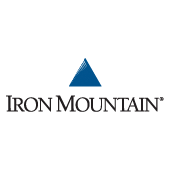Iron Mountain and PwC launch new Information Value Index to help companies benchmark their own performance
Just four per cent of businesses are able to extract the full value from the information they hold, with over a third (36 per cent) lacking the tools and skills they need to do so, according to new research from storage and information management company, Iron Mountain (IRM) and PwC. As a result, 43 per cent of the European and North American companies surveyed obtain little tangible benefit from their information, and 23 per cent derive no benefit whatsoever.
The study questioned 1,800 senior business leaders, divided equally between Europe and North America, in mid-sized (over 250 employees) and enterprise-level organisations (over 2,500 employees).
The results of the study have been used to create an Information Value Index that measures how well different businesses in different countries currently manage their information for competitive advantage. With an average score of 50.1 out of an ideal score of 100 (46.9 in the UK), the index confirms that the vast majority of businesses ‒ regardless of size, geography or sector ‒ have a long way to go before they can fully release the value from their information.
The findings show that, despite the belief held by 64 per cent of UK business leaders that they are already making the most of their information, a look at the resources their organisations currently have in place tells a very different story.
Over a quarter (26 per cent in the UK) of those surveyed don’t employ data analysts to extract value from information, or lack the data interpretation skills (19 per cent in the UK) or insight application capabilities (27 per cent in the UK) required to turn information into the decision-ready facts, targeted marketing campaigns and improved processes, innovation that deliver a return on information.
The study also reveals that many UK organisations are failing to effectively manage their information as it travels through the business. Nearly one in five doesn’t believe the organisation knows what information it holds (16 per cent), how it flows through the business and where it is either most valuable (28 per cent) or most vulnerable (23 per cent).
“How businesses think and talk about their information has changed. The conversation is bigger now. Risk and reputation still feature prominently, but the discussion now includes the idea that making the most of information can improve operations, open up new opportunities and help secure competitive advantage. Our research with PwC shows how a lack of skills and technical capabilities as well as a number of cultural factors are holding many companies back from achieving this goal. The impact of this shortfall is felt right up to the board room. Businesses that don’t catch up with the front runners in their industry risk becoming irrelevant,” said Elizabeth Bramwell, director at Iron Mountain.
Commenting on the research Richard Petley from PwC says that information is among the most undervalued assets in the commercial world: “Every transaction with a customer and every interaction with a stakeholder delivers market intelligence, customer insight, an opportunity for innovation and the potential for profit. Yet our Information Value Index shows that only four in a hundred businesses are sweating their information assets to create competitive advantage. When it comes to information management, many of the world’s leading organisations don’t know what they don’t know and aren’t trying to find out. In a 24/7 digital world, information is insight and insight is power and the falling cost of technology means it has never been easier to harness information and use this like any other asset in the business. The introduction of our Information Value Index sets a new benchmark against which organisations can measure how their information assets are being exploited.”[su_box title=”About Iron Mountain” style=”noise” box_color=”#0e0d0d”] Iron Mountain Incorporated (NYSE: IRM) is a leading provider of storage and information management solutions. The company’s real estate network of 64 million square feet across more than 1,000 facilities in 36 countries allows it to serve customers around the world. And its solutions for records management, data backup and recovery, document management and secure shredding help organisations to lower storage costs, comply with regulations, recover from disaster, and better use their information for business advantage. Founded in 1951, Iron Mountain stores and protects billions of information assets, including business documents, backup tapes, electronic files and medical data.[/su_box]
Iron Mountain Incorporated (NYSE: IRM) is a leading provider of storage and information management solutions. The company’s real estate network of 64 million square feet across more than 1,000 facilities in 36 countries allows it to serve customers around the world. And its solutions for records management, data backup and recovery, document management and secure shredding help organisations to lower storage costs, comply with regulations, recover from disaster, and better use their information for business advantage. Founded in 1951, Iron Mountain stores and protects billions of information assets, including business documents, backup tapes, electronic files and medical data.[/su_box]
The opinions expressed in this post belongs to the individual contributors and do not necessarily reflect the views of Information Security Buzz.



